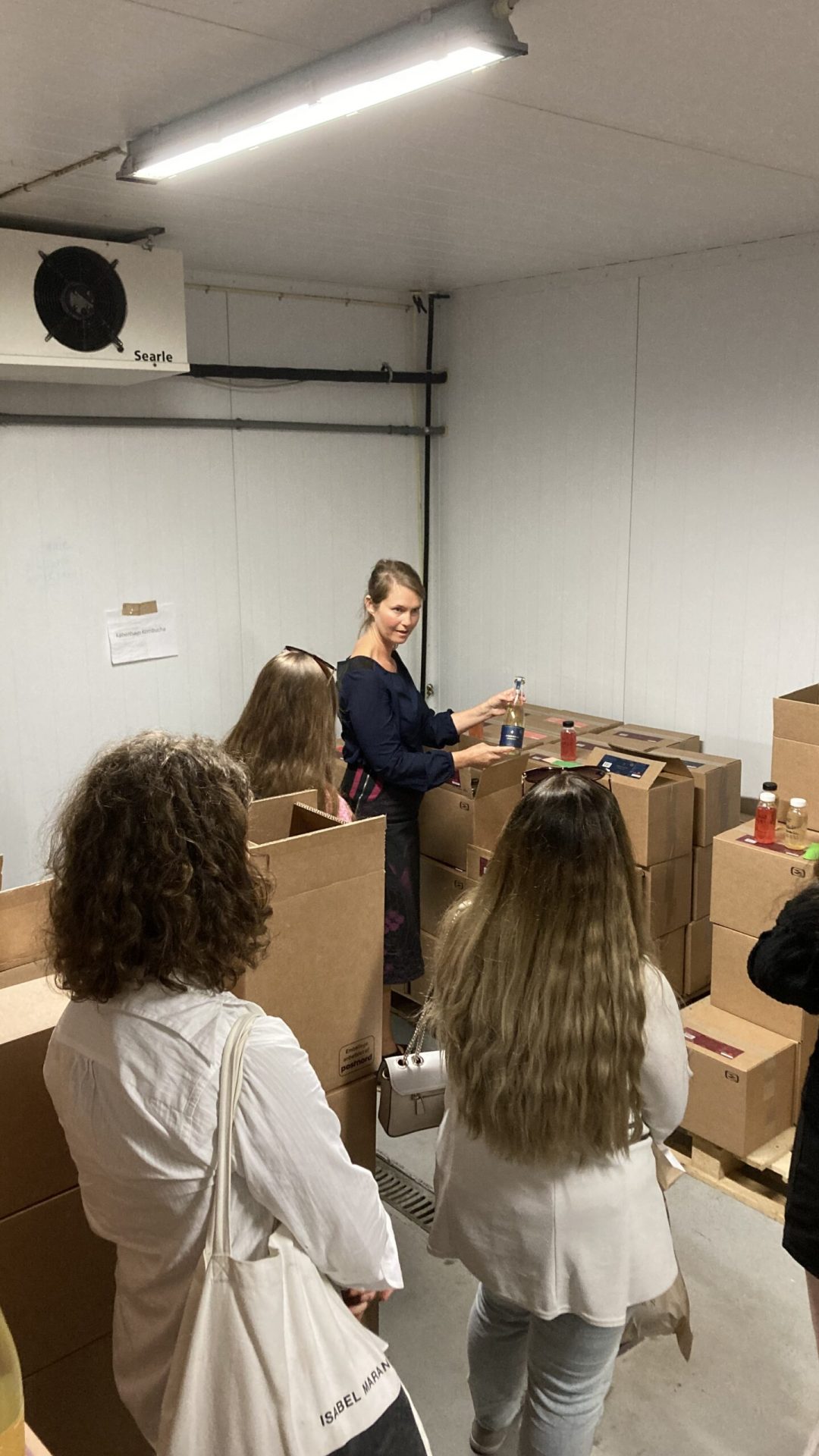Q: What’s your professional background?
A: I am a business engineer with a specialization in civil engineering. I’ve been working in many fields – within marketing, as a manager for a global purchasing team, spent some time at Novozymes and GE, and many years abroad. I worked and lived in Paris, Germany, and Austria, and then I decided to come back to Denmark.
Q: How did you learn about kombucha?
A: My idea was actually to create a business within the food sector because I thought it’s interesting and exciting. Looking at my background, I have many different perspectives and skills. The only thing I didn’t know much about was food. I like to learn new things and therefore I thought “Why not?” That’s when I started to look into the kombucha market.
It is quite annoying that we cannot get many alcohol-free beverages at cafes, restaurants, or bars. There is hyldeblomst or coke but if you don’t want that, then your option is to drink water. We need something a little bit more exciting. Something has been missing in the market and if it ever existed, there has not been enough of it in Denmark. Kombucha is much nicer than soft drinks and it is closer to wine which is what I like about it. It’s also a bit difficult to produce but the flavors are very nice. As a beverage, it has a lot of openings, different ways of developing and turning it into many other products.
Q: So kombucha was something you found out yourself?
A: I’ve learned that there is a huge market for kombucha in the US and in the UK it’s really been gaining there. In Denmark, it hasn’t been popular. I also didn’t see it specifically as kombucha itself. I wanted to create a product that is unique on its own – something that has a really nice taste, nice bubbles, and where you can have the feeling of drinking wine. The name came a little bit in between. What I make is a kombucha, but it is a luxury product, where you really get the natural carbonation and the long-term conservation of the product giving it a nice feel.

Q: What is the vision of your company? What are you trying to say with your products to the customers?
A: With København Kombucha I’m trying to tell people that it is possible to enjoy a drink without having to drink alcohol. You can have fun without alcohol. Everybody should be able to join the moments with friends, enjoy a good taste, but also have a choice of being able to go home with a safe head or go out running the day after. In Denmark, we’ve been drinking like crazy, but I think it’s shortening a little bit. People are getting more conscious about their health. They are starting to realize that they don’t have to drink that much to enjoy time with friends.
What is important for me is that I didn’t have to go down on taste. The taste has to be there, like in your miso. Our kombucha won a Sol over Gudhjem price in 2019. This success also showed more understanding and demand for high-quality products.
On the other hand, the market is so boring. Non-alcoholic beers have been a huge success, but beers have a very specific flavor that not everyone enjoys. So why not make a wine-style beverage that people can also enjoy? København Kombucha has a feeling of an “adult drink”. It is a more mature drink with a lot of flavors instead of just a flat feeling of childhood.
Q: Where do you get your inspiration for new flavors from?
A: I’m a very curious person. I’m all over the place, looking and searching. That’s why I’m also talking to you. Learning about miso allows me to learn about flavors I don’t know. I’m joining these talks, listening, and learning. Then I ask myself <>. That’s what I do. I guess that’s my life. That’s what I’ve always done.
Q: How does the quality of the ingredients reflect on the quality of final products?A: If we don’t have a high-quality ingredient, you cannot get a good final product. It’s actually quite simple but very important. That’s also why we only use the selected, organic high-quality teas and keep the same suppliers to maintain a consistent taste. Even with that, the products are slightly variating. Like with wine, every new batch is slightly different. Even though we try to keep it in the same line, it’s not 100% possible.

Q: Can kombucha be innovative?
A: That’s what I think I’m doing. I innovated it in a way that it goes through a second fermentation in the bottles to build the velocity of flavors. It also builds bubbles to give the right feeling of a high-end product to enjoy. Creating different tastes is another part of it. We are innovative in many other areas. We are always looking into the possible use of our brewing leftovers.
Q: Are you planning on expanding the portfolio of København Kombucha with other products?
A: The central focus of København Kombucha is of course to make people enjoy good flavor drinks with the possibility of driving and so on. But we always have some tea and flower that we should be reusing. I don’t see a reason to throw out everything or anything. That’s why there’s a separate area we’re looking into as well. For now, we’re trying to create gin and see if it’s something people are interested in. It is a little bit conflicting with our primary focus, but it’s still all about building flavors. You can also mix that gin with kombucha and enjoy it as a gin and tonic. You don’t need to drink a bottle of gin but be able to join the party. For us, it is all about building the flavors and being innovative in a new way. Why does it always have to be a gin & tonic? It can also be a gin & kombucha.
I am launching a crowdfunding campaign next month to see if there is actual interest in gin called “Remade by København Kombucha”. [NOTE: The campaign has already finished with 100% success!]
Q: How do you perceive the saturation of the non-alcoholic beverages market? Is there still a place for the newcomers?
A: I think there’s lots of space! Denmark is not a “kombucha country” yet. There are only a few producers that have been managing to penetrate the market. It is still small though. And it is really difficult to expand in Denmark because we are very conservative. Although, I think that the more producers on the market, the more we all would start drinking kombucha. We would go to a cafe or a restaurant and ask directly for kombucha. And of course, I would like people to ask for København Kombucha because it is in a different league. It is a different product in a way.
Q: Do you cooperate or plan on collaborating with other food and beverage producers in Denmark
A: Yes, definitely. I do as much as I can. That’s how bee pollen kombucha was made. We’re also going to put cashew fruits in our kombuchas soon.
Q: What is this?
A: There’s a company that upcycles cashew nut fruits. They process it into a compressed puree that we will be using for the kombucha. We are a fully organic producer, so we have to wait a little longer for our new partners to convert their production to organic too. Then we’ll be ready to kick off!
Q: In your opinion – Do you think that the kombucha market is going to expand locally in the future?
A: Yes, I do think so. If we look at other countries – the States or the UK, Germany and even Sweden. everybody is attacking the markets. Here, we are way behind. I think that the Danish market is going to expand a lot. The market has been stagnating a bit because of the corona since we’ve been unable to travel. Before, people used to bring memories back from abroad and miss uncommon flavors. With the opening up for the travels after the pandemic, things will change. It is going to build more interest.
Q: Does Denmark have any heritage or history of fermenting foods?
A: What we don’t know in Denmark is that a lot of fermented foods are actually something we normally use. For many people, it comes as a little bit of surprise that much stuff we get from Asian stores, different types of fish sauce, and soy sauce – all of this is fermented. That’s why I love fermented foods. Like with the miso balls – fermentation builds the flavors and creates more depth to the taste. In kombucha or wine, you can distinguish different flavors and floral notes very well. It all comes from fermentation. I think we are missing that in the Danish food.
We don’t have a history of making sauerkraut and such, ourselves. In Denmark, from the old days, we’ve been doing asier (gherkins). If I look back to my grandma, what she did was pickled cucumbers, but it has been more of a vinegar pickle [syltet].
In the 70s a lot of people have been doing kombucha, actually. I know a lot of people from these times that know about it and they are the ones used to the vinegar flavors. There’s a bit of it in kombucha and some of these people love it because of that.
Q: Is there some final note you would like to put in or something you would like to tell people through this interview?
A: I guess I would like to encourage people to look for good quality products, to choose luxury. To drink good kombucha is the same as drinking a good bottle of champagne. You can have force-carbonated kombucha with removed yeast and so on, but our brewing processes guarantee the full flavor for joyful moments.
Q: Wonderful! Thank you, so much and good luck!
A: Thank you!







